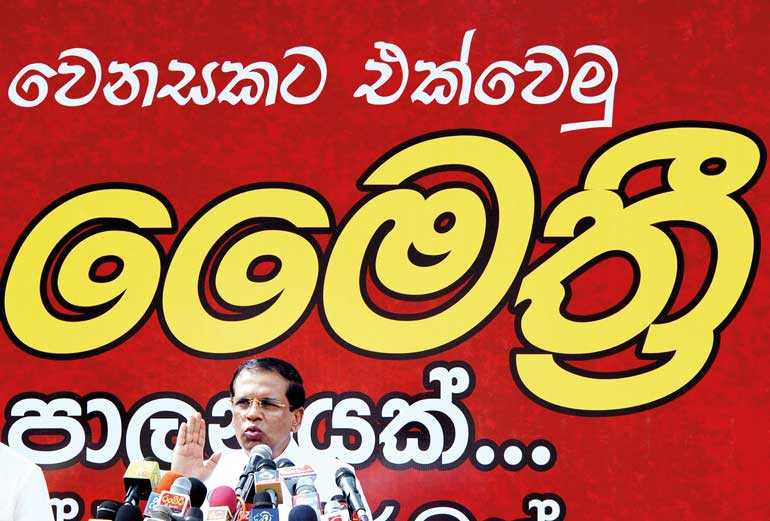Tuesday Feb 24, 2026
Tuesday Feb 24, 2026
Monday, 31 December 2018 00:00 - - {{hitsCtrl.values.hits}}

It appears to be that President Sirisena continues to violate the Constitution. Prior to the 19th Amendment to the Constitution according to Article 44(2), “President may assign any subject or function to himself”. 
Since this provision was withdrawn by the 19th Amendment, the President does not have any right to hold any ministerial portfolio. However, according to Section 51 of the other Consequential Amendments in the 19th Amendment to the Constitution, “notwithstanding anything to the contrary in the Constitution, the person holding office as President on the date of commencement of this Act, so long as he holds the Office of President may assign to himself the subjects and functions of Defence, Mahaweli Development and Environment and determine the ministries to be in his charge for that purpose.”
Therefore, the attempts made by the President to keep the Police Department and Government Printing Department under him would be unconstitutional. Also, he has gone on a private vacation to Thailand without issuing gazettes assigning subject matters to the ministries. Let alone a Head of a State, even a CEO of a private sector organisation would not do this type of act. In this way the President repeatedly reveals that he is not suitable for the post.
Opposition Leader and Presidential portfolio – A clash of ethics
There is a question raised whether it is ethically correct for Mahinda Rajapaksa to hold the post of Opposition Leader while the President, who is of the same party, is the head of the government. N.M. Perera raised this question in 1978. Not only in our Constitution but also in the French Constitution the President and the Prime Minister can be of opposing parties. When D.B. Wijetunga was the President and Chandrika Kumaratunga was the Prime Minister, DBW held the portfolio of Defense citing that according to the Constitution he was the Commander In Chief of the Armed Forces. The Opposition Leader was from the UNP, Gamini Dissanayake. When Chandrika Kumaratunga was the President and Ranil Wickremesinghe was the Prime Minister, CBK did not hold any portfolio and the Opposition Leader was from CBK’s party, Mahinda Rajapaksa.
Apart from the law, under ethical grounds, the incumbent President can hold the said portfolios since there was an understanding that he would be in a coalition government. Since he and the party headed by him had withdrawn from the coalition government, he has no ethical right to continue to hold those portfolios. This person does not even understand the law. Therefore, how can we convince him of morality? According to the Constitution, as stated above, the President “may assign to himself the subjects” and it is not mandatory for him to hold those portfolios. If he does not hold those portfolios, there is no issue for Mahinda Rajapaksa to hold the post of the Opposition Leader subject to the conditions arising out of him getting the membership of the flower bud party.
Appointees to the Cabinet of Ministers
It was also reported that the UNF had send a list of 37 ministers as appointees, which includes the Prime Minister, to the President. He has cut off eight names out of that and eventually 29 ministers were appointed.
Article 46 (1)(a) states that the total number of ministers of the Cabinet of Ministers shall not exceed 30. Article 46 (4) states as follows: “Notwithstanding anything contained in paragraph (1) of this Article, where the recognised political party or the independent group which obtains highest number of seats in Parliament forms a National Government, the number of ministers in the Cabinet of Ministers, the number of ministers who are not Cabinet of Ministers and the number of deputy ministers shall be determined by Parliament.”
Article 46(5) states as follows: “For the purpose of paragraph (4), a National Government means a Government formed by the recognised political party or the independent group which obtains the highest number of seats in Parliament, together with the other recognised political parties or independent groups.”
The UNF may have decided to send 37 names to the President assuming that there is a National Government under Articles 46. However, it is naïve to assume that there is a National Government with the sole MP of Muslim Congress and with the few MPs from the SLFP. It is not fit for a political party which accused the President of violating the Constitution and got a court order confirming that. Thereafter UNF argued that there should be 30 ministers other than the President and the Prime Minister. According to Article 46(1)(a) the maximum number of ministers should be 30. According to Article 42(3), the President shall be a member of the Cabinet of Ministers and shall be the Head of the Cabinet of Ministers. Moreover, he holds three portfolios. Therefore, the Cabinet of Ministers should not exceed 30 inclusive of the President and the Prime Minister.
It was also reported that UNF is planning to ask the opinion of the limit of the Cabinet from the Supreme Court through the President. It appears to be that the UNF is also trying to fall into the disgraced position where the President has fallen. What UNF should have done was to send 29 names of proposed ministers including the Prime Minister to the President. If they wanted, they could have included the names of Sarath Fonseka and Palitha Range Bandara as well. It is true that it would have been a difficult task to select 28 names out of a vast number. However, the leadership should have been able to perform that task. It may have been a political strategy, but it was a disgrace to get the names cut by a person like the President. If the name of Sarath Fonseka was included in that list President can cut his name unconstitutionally. If the UNF do not take a challenging stance with the President at this point they will also fall the same shameful position as the President.
In the last analysis it was ironical that the UNF was also trying to do the same thing that was tried by notorious legal experts, Sarath N. Silva, Wijeyadasa Rajapakshe and G.L Peiris, along with the Mahinda Rajapaksa faction and the President, to interpret the Constitution without considering it in its entirety or the background political and social dialogue which preceded the drafting of the Constitution and the intentions of its law makers. Instead they were only interested in finding its loopholes.
Mainstream media bias vs. social media
At this point the mainstream media is reluctant to analyse the issues from a national perspective. Considering the State media, the biased manner those institutions worked during that 51-day period was evident. The two Government-owned television channels are biased towards the Government. One of the private television channels is biased towards UNP. Another channel criticises the UNP Leader heavily and upholds the figure of its Deputy Leader and selected others. The other channel supports Mahinda Rajapaksa.
The majority of print media supports Mahinda Rajapaksa. The unfortunate point is that some of them publish news from an extremist Sinhala Buddhist view in order to inflate communal misunderstandings. False news and half-truths are being published for this purpose. Overall, the English newspapers are not biased to the extent of the Sinhala ones.
However, the capacity of these media institutions to direct the public opinion is diminishing. The main reason for it is internet-based social media. Unlike mainstream media, internet-based media is open to dialogue. Sometimes the participants in these social media networks show their inability to engage in discussions in a democratic way, but the future is there.
It is the duty of the organisations of this country’s civil society to engage in a more democratic discussion using these networks; to challenge the behavior of the mainstream media institutions; to disclose the names of the journalists who publish fake news along with the names of their institutions and the name of the owners of such institutions; and finally to discuss the national issues and human rights in a platform of national perspective rather than from perspectives of ethnic groups, religious or political parties.